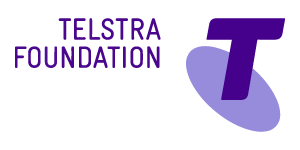
New funding announced for three Australian start-ups harnessing the power of technology for good
4 May 2022
New funding announced for three Australian start-ups harnessing the power of technology for good
Humanitech, an initiative of Australian Red Cross, has announced funding for three local initiatives addressing humanitarian challenges through the innovative use of frontier technologies.
Three Australian start-ups are receiving a funding boost this week as part of Humanitech’s Innovation Lab, which supports new organisations applying emerging technology to social and humanitarian issues to validate, pilot and scale their impact.
Supported by founding partner, Telstra Foundation, the successful start-ups will each receive $100,000 to validate their business case through a pilot, accessing industry experts and support to work closely with a community that has been impacted by the start-up’s area of focus.

The selected organisations include a flood forecasting tool to improve the emergency response cycle – most recently used in Australia’s east coast floods, a climate intelligence platform enabling communities to prepare for the impact of heat events driven by climate change, and a multilingual communication app empowering culturally and linguistically diverse women to navigate Australian healthcare settings.
“Working with these organisations, we are able to explore how technologies can be scaled to address wicked problems – and also the challenges that frontier technology creators may face when trying to do things differently,” said Alastair Pryor, Humanitech Lab Manager.
As an initiative of Australian Red Cross, supported by founding partner Telstra Foundation, Humanitech’s Innovation Lab launched last year to provide a unique opportunity to emerging start-ups. It combines funding, innovation, technical and community expertise to ensure new and emerging technologies are being utilised in a way that considers their impact on people and communities.
“Technology has the power to solve pressing challenges in society, but integrating people and communities in the design and development process is key to doing this successfully,” said Jackie Coates, Head of Telstra Foundation.
“Humanitech’s Innovation Lab is generating important insights through sharing, collaboration and experimentation on the new approaches required to developing and scaling technology for social impact," Ms Coates continued.
The Humanitech Lab: Stage 2 cohort:
- Climasens: Climasens provides climate intelligence to communities, enabling them to assess, analyse and prepare for the future impacts of climate-change related heat events. Climasens is currently working with Australian Red Cross to develop a Heat Social Vulnerability Index to determine how extreme heat events may impact residents across Queensland, with plans to scale the tool across Australia.
- FloodMapp: Floodmapp provides real-time flood forecasting, inundation modelling and emergency management across all stages of emergency response - delivering critical flood extent data dynamically, in real-time and as a common operating picture. FloodMapp will pilot with Australian Red Cross and partner councils to provide high quality, real-time flood intelligence.
- Good Hood: Good Hood enables multilingual health communication for women by providing high-quality, culturally informed and translated health information. Through the Humanitech Lab, Good Hood seeks to pilot MamaTongue, an application powered by Solinary, to support women from culturally and linguistically diverse (CALD) backgrounds to communicate during pregnancy with the support of a device-based text and audio translation application.
From a global pool of more than 120 applications, six organisations completed the first stage of Humanitech’s Innovation Lab to validate their idea, including Climasens, FloodMapp and Good Hood.
The second stage provides an important opportunity for the start-ups to deepen their understanding and connection with communities that are experiencing vulnerability - whether that be through climate change, disaster, or unmet accessibility needs.
“We’ve seen communities ready and willing to work with the cohort to explore alternative approaches to pressing humanitarian problems through frontier technology,” Mr Pryor continued.
“It’s exciting to see what opportunities are possible when combining these start-ups with technological innovation, partnerships and community.”

